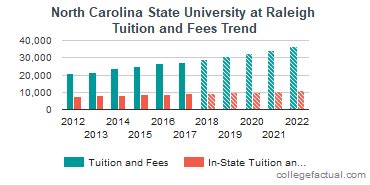Introduction
As a student pursuing higher education, navigating the complexities of instate tuition requirements can be a daunting task. Understanding the eligibility criteria, deadlines, and documentation required is crucial to secure the most affordable tuition rates. In this comprehensive guide, we delve into the intricacies of NC instate tuition requirements, providing a step-by-step overview and addressing common queries.

Understanding the Basics
In North Carolina, instate tuition rates are offered to students who have established residency in the state. Residency is determined based on factors such as domicile (the location where one intends to make their permanent home), physical presence, and intent to remain in the state.
Eligibility Criteria
To qualify for instate tuition in North Carolina, students must meet the following criteria:
- Domicile: Have established their permanent home in North Carolina for at least 12 consecutive months prior to the first day of classes.
- Physical Presence: Have physically resided in North Carolina for at least 12 consecutive months prior to the first day of classes.
- Intent to Remain: Intend to make North Carolina their permanent home for an indefinite period.
Documentation Requirements
To prove eligibility, students must submit the following documentation:
- Proof of Domicile: Driver’s license, voter registration, property tax bills, mortgage statements, or rental agreements.
- Proof of Physical Presence: Utility bills, bank statements, or employment records.
- Affidavit of Residency: A written statement signed by the student affirming their intent to remain in North Carolina.
Deadlines
The deadline to apply for instate tuition is typically 30 days after the first day of classes. Students should contact their institution’s admissions or residency office for specific deadlines and instructions.
Common Exceptions
There are certain circumstances where students may be eligible for instate tuition despite not meeting the standard criteria. These include:
- Dependents of Military Personnel: Students whose parents are active duty military personnel stationed in North Carolina.
- Emancipated Minors: Students who have legally established their own domicile in North Carolina.
- Students with Disabilities: Students who have a disability that prevents them from establishing physical presence in North Carolina.
Strategies for Establishing Residency
If you do not meet the residency requirements, you may consider the following strategies:
- Move to North Carolina: Establish a permanent home in the state and physically reside there for 12 consecutive months.
- Attend a North Carolina Community College: Complete at least 12 credit hours at a North Carolina community college before transferring to a university.
- Obtain an Exception: Contact your institution’s residency office to inquire about eligibility for an exception based on extenuating circumstances.
Frequently Asked Questions (FAQs)
-
How can I prove that I intend to make North Carolina my permanent home?
- Sign an affidavit of residency.
- Establish a driver’s license, register to vote, or purchase property in North Carolina.
- Demonstrate financial ties to the state, such as bank accounts or employment.
-
Can I apply for instate tuition after the deadline?
- Yes, you may submit a late application, but it may be subject to additional review and approval.
-
What happens if my residency status is denied?
- Contact the residency office to appeal the decision and provide additional documentation or evidence.
-
Can I lose my instate tuition status?
- Yes, if you move out of North Carolina or establish a permanent home elsewhere.
-
Is there an income requirement for instate tuition?
- No, there is no income requirement for instate tuition in North Carolina.
-
Can I claim instate tuition if my parent or spouse is a North Carolina resident?
- Yes, if you are claimed as a dependent on your parent’s or spouse’s tax return and they meet the residency requirements.
Conclusion
Understanding the NC instate tuition requirements is essential for students seeking to secure the most affordable tuition rates. By carefully reviewing the eligibility criteria, documentation requirements, and deadlines, students can navigate this process with ease. If you do not meet the standard criteria, consider the various strategies and exceptions available to establish residency. Remember, the residency office is always a valuable resource for guidance and support throughout this process.
